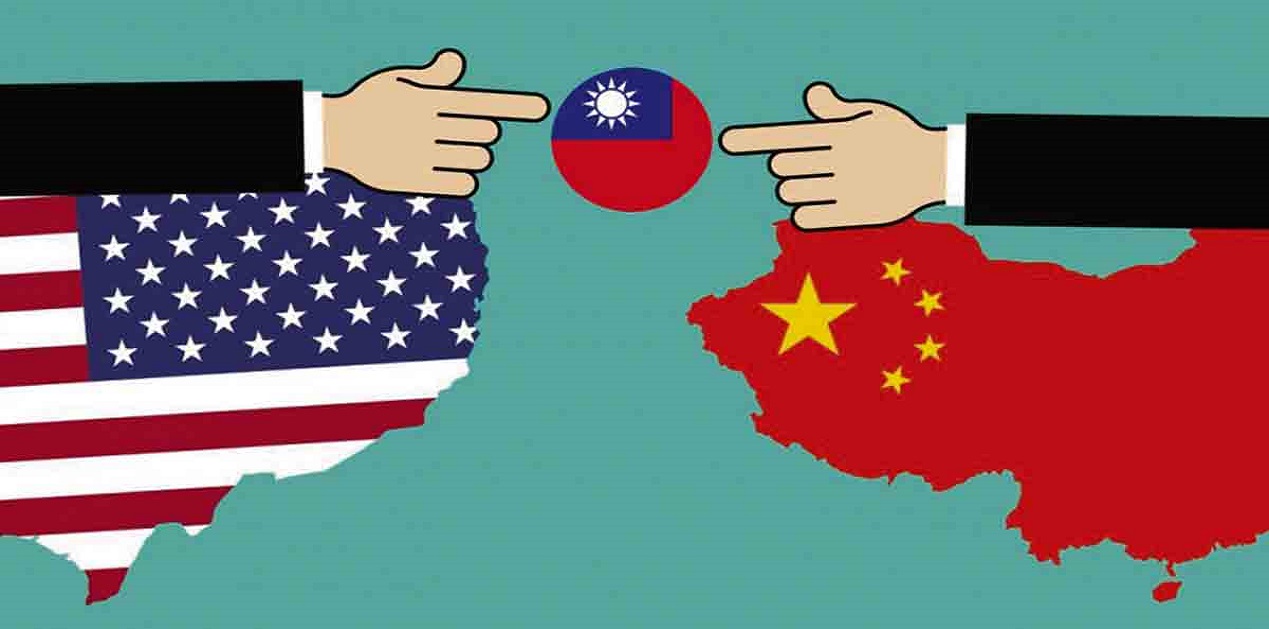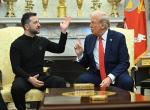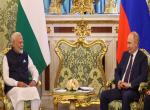Russia’s special military operation in Ukraine has dramatically altered the geopolitics of the world. When Russia’s Foreign Minister warned of the possibility of a nuclear war and Russian President Vladimir Putin placed his nuclear forces at an elevated state of alert, warning that if any outside parties try to interfere, the consequences could be such that the world has never seen before. The US took notice of such sabre-rattling immediately. In this changing matrix when the US remains engaged on the Ukraine issue in cooperation with the NATO forces, the danger to world peace comes from elsewhere. The danger is what if China takes advantage of this fluid situation and forcibly invades Taiwan, which it considers as a renegade province and must be integrated into the mainland? The moot question is if Beijing does indeed choose such an adventurous step, would Washington come to Taipei’s aid? The threat of escalation could outstrip even the current nerve-wracking situation in Europe.
In late May in Tokyo, the US President Joe Biden used his first in-person summit with Japanese Prime Minister Fumio Kishida where he addressed the issue of Beijing’s “increasingly assertive behaviour”. While interacting with the media, when a reporter asked him if the US was willing to “get involved militarily to defend Taiwan”, Biden gave a flat “yes”. It may be recalled that when the US scrapped its formal commitment to defend Taiwan in 1979, replacing a treaty of alliance with the Taiwan Relations Act, it obliged the US to help equip Taiwan to defend itself but does not mandate the US to step in militarily to defend Taiwan if China invades. The Taiwan Relations Act ensures that Taiwan has the required resources to defend itself and to prevent any unilateral change of status in Taiwan by Beijing. Biden’s open admission to militarily defend Taiwan if China invades is a break with decades-old policy and thus clear departure from the earlier stance. Biden’s open admission came after China was “flirting with dangers” by repeatedly conducting military exercises in the vicinity of Taiwan, part of actions that Biden and others saw as a precursor to invasion.[1]
This was the third time in less than a year that Biden publicly declared that the US would use force to keep Beijing from seizing the island. The White House was quick to clarify that the US position remains unchanged, that it continues to adhere to a One-China policy and maintains “strategic ambiguity” rather than open commitment to defend Taiwan militarily if it comes under attack. Whether Biden’s flat “Yes” to the reporter’s question was deliberate or not is confusing but a policy drift definitely risks bringing about conflict, not strengthening deterrence.[2]
Though China has been threatening on numerous occasions to use of force to integrate the island to the mainland for a long time, it has refrained from executing such a threat. What probably China has preferred is gradual pressure and intimidation to achieve the reunification as it wants to avoid open confrontation because the costs would be enormous. This does not mean that a military assault on the island nation is ruled out given that Beijing has acquired adequate military muscle and might not be averse to the idea of using military force to achieve reunification. There is yet another way to look at the Taiwan issue. If Beijing is convinced that the US is unlikely to change its position in seeing Taiwan as a strategic asset, either it would launch an invasion and face the consequences or accept that Taiwan is lost forever. The PLA probably knows that if China takes military action, the US would inevitably intervene militarily to defend Taiwan and this realisation shall deter Beijing from taking any unnecessary militarily provocative measures.
The real confusion is there is no strategic clarity in the US policy on Taiwan. Whether this is deliberate to keep Beijing in a continuous phase of guessing or not is difficult to say. What is however more plausible to believe is that the US shall continue to keep the political status quo and the unofficial diplomatic relations with Taiwan shall continue as its ties with China are intertwined heavily on the economic front and neither can do without the other. While unofficial ties such as high-level contacts with Taiwan have increased, growing hostility across US-China relations has deepened. The world’s two leading economic powers are engaged in intense economic, technological and security competition. Biden’s announcement to defend Taiwan militarily thus stems from the US decision to degrade its long-standing policy towards China. If however, Taiwan feels encouraged to drift towards independence, Beijing might not hesitate to take military action on Taiwan, no matter if that means risking military and economic conflict with the US. If at any point of time Beijing feels that Taiwan has crossed the read-line a repeat of what Russia did in Ukraine might not be unthinkable in Taiwan irrespective of the consequences. That is the red-herring the world needs to be wary of.
For the US, the burden to protect Taiwan has emerged stronger after Russia’s military operation in Ukraine, which is why Biden made the most powerful presidential statement in Tokyo in support of the self-governing Taiwan.[3] So far the US had refrained from making such explicit security guarantee to Taiwan as it does not have a mutual defence treaty after diplomatic switch in 1979. Biden is worried that another front similar to Ukraine shall unfold in Taiwan if Beijing decides to become adventurous. The US maintains unofficial contacts including a de facto embassy in Taipei and supplies military equipment for the island’s defence.
China has stepped up its military provocations against Taiwan in recent years aimed at intimidating it into accepting Beijing's demands to unify with the communist mainland. Chinese military aircrafts have flown into Taiwan’s airspace a number of times. In a recent manoeuvre, 30 Chinese military aircraft entered into the south-western part of Taiwan’s Air Defense Identification Zone (ADIZ) on 30 May 2022. According to the Ministry of Defense of Taiwan, it was the second-highest single day total in 2022. The aircraft consisted of two KJ-500 airborne early warning and control planes, four Y-8 electronic signals intelligence aircraft, one Y-8 electronic warfare aircraft, one Y-8 anti-submarine warfare plane, six Shenyang J-16 fighter jets, eight Shenyang J-11 fighter jets, four Chengdu J-10 fighter jets, two Sukhoi Su-35 fighter jets, and two Sukhoi SU-30 fighter jets. [4] In response, Taiwan scrambled a combat air patrol, sent radio warnings, and deployed defence missile systems to track the Chinese military planes. The highest number of incursions reported in 2022 was 39 on 23 January. [5] Taking note of these manoeuvre, Biden warned that Beijing is flirting with danger by flying so close of Taiwan.
The South China Morning Post observed in an editorial that Biden is playing with fire with comments on defending Taiwan and eroding the One-China principle in such tense times is dangerous and could easily backfire.[6] It observed that Biden’s unambiguous remark on such a sensitive issue was worrying in a tense geopolitical environment. Despite that the US maintains official ties with China, anti-Chinese sentiments among American lawmakers have grown, visits of leaders have increased, besides with greater arms sales. Beijing has taken notice of this. Beijing was miffed further that the US State Department altered the wording on the Taiwan fact sheet on its website, removing a declaration that Washington does not support its independence. Interestingly, Taiwan was excluded from the Indo-Pacific Economic Framework, which Biden enthusiastically promoted in Tokyo during the Quad summit.[7] This makes Biden’s stance on Taiwan confusing. Even in the past, former US presidents have taken positions or made statements that created more confusion than clarity on what the real US policy on Taiwan is. Biden’s comments only add to this confusion. [8]
Despite the brazen public statements by Biden and strategic plots, and projecting China as the aggressor, it is unlikely that the US wants a war over Taiwan issue. Biden’s statement and that of some other lawmakers seem to have been influenced by Elbridge A. Colby’s recent book The Strategy of Denial: American Defense in an Age of Great Power Conflict in which he argues that to ensure America’s freedom, security and prosperity, the US must maintain a favourable military-economic balance of power with respect to key regions of the world. Colby further argues that Asia’s demographic and economic weight clearly place that region as the most important to American interests, and therefore the cornerstone of American policy must ensure that Asia is not subjected to regional hegemony. To maintain a favourable balance of power, the US, along with allies, friends, and partners (the anti-hegemonic coalition), must be capable of prevailing in a regional war initiated by an aspiring hegemon. Colby’s argument is centered on how China is emerging as the new hegemon that is detrimental to the US interests.[9]
Colby’s concept of “the strategy of denial” with respect to China has three strands of argument: a war over Taiwan is desirable or else China’s rise will be unstoppable; the US has a chance of winning such a war with the regional allies by its side; and China must be provoked into appearing as the aggressor. If Biden is persuaded to buy such argument and makes controversial statements, it would only make Biden look credulous because as the responsible leader of the only great power, his priority should be to avoid war, not provoke a war. Therefore, tensions over the Taiwan issue likely to remain alive for quite some time as neither the US nor China is likely to retreat.
Real or imaginary, the continuous incursions by the Chinese Navy and Air Force into Taiwan’s territory and airspace provides fodder for the US to harp on the Chinese danger that it would Taiwan one day. The US has already effectively, if not formally, abandoned the One-China policy. Implicitly this means that the US policy wants to prevent the reunification with the mainland by all means.[10] The truism is that Taiwan’s geographical positioning endows some criticality to the region’s security which is vital to US interests in the Indo-Pacific. The US is keen to defend those interests.
Does it mean that a war is imminent over Taiwan between the rival powers? The answer is both ‘Yes’ and ‘No’. It is Yes, because both the US and China have adopted rigid positions and are unwilling to concede an inch. No, because damage to their economic interests that a war would cause when breaks out would deter both to become adventurist. In the event of a war breaking out, it is not expected to remain confined to Taiwan only but inevitably drag on other regional allies. Moreover, the fear of the possibility of the war going nuclear shall keep all stakeholders on the edge. This leaves Taiwan with the only option to strengthen its own defence, stay committed to engage with the world economically and not waste much of its energy in worrying about the China threat. Even without formal diplomatic relations, Taiwan has many friends who shall come definitely to its rescue at the time of need.
The question that remains unanswered is: Is Taiwan a flashpoint where just amber is required to be ignited and who fires the first shot? Or is it the South China Sea where China’s unjustified claims too much of this oceanic space has irked other claimants and thus another flashpoint? The quick answer is both are vulnerable fault-lines to Indo-Pacific security and must be plugged. This means huge responsibilities for the stakeholders, particularly those capable of enforcing rules of law with smaller but with equal interests working as appendage to secure peace and stability in the region. Any unilateral action by a single power must be checked by democratic means. For now, both Taiwan and South China Sea are destined to remain vulnerable points in the Indo-Pacific region for quite some time.
Endnotes :
[1]Jesse Johnson, “Biden vows to defend Taiwan as Kishida pledges unprecedented hike in defense spending”, The Japan Times, 23 May 2022, https://www.japantimes.co.jp/news/2022/05/23/national/politics-diplomacy/fumio-kishida-joe-biden-summit/ (Accessed on 31 May 2022)
[2]Stephen Wertheim, “The Troubling Repercussions of Biden’s Taiwan Gaffes”, 24 May 2022, https://carnegieendowment.org/2022/05/24/troubling-repercussions-of-biden-s-taiwan-gaffes-pub-87196?utm_source=ctw&utm_medium=email&utm_campaign=buttonlink&mkt_tok=O (Accessed on 31 May 2022)
[3] “Biden: U.S. would intervene with military to defend Taiwan”, Asahi Shimbun, 23 May 2022, https://www.asahi.com/ajw/articles/14627916 (Accessed on 24 May 2022)
[4] “30 Chinese military aircraft enter Taiwan's ADIZ”, 30 May 2022, https://www.globalsecurity.org/wmd/library/news/taiwan/2022/taiwan-220530-cna01.htm?_m=3n%2e002a%2e3340%2eon0ao069c5%2e33ky (Accessed on 31 May 2022)
[5]Ibid.
[6] “Biden is playing with fire with comments on defending Taiwan”, South China Morning Post, 24 May 2022, https://www.scmp.com/comment/article/3179028/biden-playing-fire-comments-defending-taiwan?utm_medium=email&utm_source=cm&utm_campaign=enlz-opinion&utm_content=20220 (Accessed on 25 May 2022)
[7]Linden Chen, “Absent from the Indo-Pacific Economic Framework, Taiwan engages in fresh trade negotiations with the US”, 31 May 2022,
https://english.cw.com.tw/article/article.action?id=3238 (Accessed on 31 May 2022)
[8]Shi Jiangtao, “Joe Biden’s comment is the latest in a long US-China tussle over Taiwan”, South China Morning Post, 24 May 2022, https://www.scmp.com/news/china/diplomacy/article/3179003/joe-bidens-comment-latest-long-us-china-tussle-over-taiwan?module=hard_link&pgtype=article (Accessed on 25 May 2022)
[9]See, Albridge A. Colby, The Strategy of Denial: American Defence in an Age of Great Power Conflict, (2021), Yale University Press.
[10]Alex Lo, “US strategy to portray China ad aggressor over Taiwan”, South China Morning Post, 24 May 2022, https://www.scmp.com/comment/opinion/article/3178981/us-strategy-portray-china-aggressor-over-taiwan?utm_medium=email&utm_source=cm&utm_campaign=enlz-opinion
(The paper is the author’s individual scholastic articulation. The author certifies that the article/paper is original in content, unpublished and it has not been submitted for publication/web upload elsewhere, and that the facts and figures quoted are duly referenced, as needed, and are believed to be correct). (The paper does not necessarily represent the organisational stance... More >>
Image Source: https://telanganatoday.com/wp-content/uploads/2021/12/052015US-CHINA-AND-TAIWAN.jpg











Post new comment